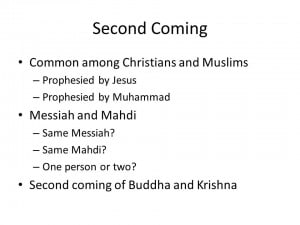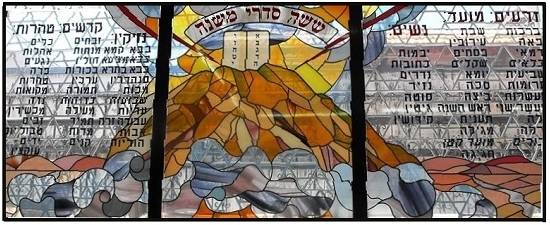[First posted in 2012, check out: Exodus/Shemoth 19: The First Coming. Reposting because of the Christian expectation that their “rapture” would occur on September 23, 2017 . Well, that date came and went and as usual, no Christian is missing from earth. Of course, with all the natural and man-caused disasters occurring at this time, all these are being ‘read’ as ‘signs’ to watch to indicate the time of the ‘rapture’. Really dear folks, how many predictions on specific dates of the “second coming of Jesus Christ” have passed and still, the faithful are waiting to meet him in the air? We know what the “New” Testament says about that future event, what about the “Old”, does it predict the same? Translation: EF/Everett Fox, The Five Books of Moses.—Admin1]
————————–
Christians talk about “the second coming” referring to the return of their “Messiah” Jesus Christ. His “first coming” was supposedly when this Son-God came to live among mankind, starting as a baby born of a virgin (the Christmas story). Messianics share the same belief about a second coming, though they set the time of the first coming or the birth of baby Jesus not on December 25 but sometime in September, the feast of Tabernacles. If that ‘sideplayer’ poster is to be believed, who would have known Muhammad prophesied a ‘second coming’ . . . of whom we have yet to determine; and that Krishna and Buddha are also expected to return. Really!!!???
James Tabor of Restoring Abrahamic Faith explains the ‘second coming’ differently and we go along with him on this one. In the last page of his book, he writes the Principles of Abrahamic Faith:
- The Second Coming of YHVH as Lord, Redeemer, Savior and King of Kings, to rule over all the earth is the hope of humankind.
- This great turn in history will be ushered in by His prophetic Messiahs/Anointed Ones, as His chief human agents who prepare the way for His coming—the Branch of David as Prince, and the final Priest/Teacher, who stands beside him.
- They will be empowered by YHVH—
- to fully restore TORAH faith in the land of Israel,
- complete the re-gathering of the Twelve Tribes,
- rebuild the Sanctuary as a House of Prayer for all Peoples,
- and call upon all nations to repent and turn to God.
Where does he base this statement?
Isaiah 11; Micah 5:2-4; Jeremiah 23:5-6; 33:14-26; Zechariah 2-4; 6:11-14; Malachi 3-4.
So, it makes sense that if there’s a second, there must have been a first. When did that happen?
Scripturally, the ‘first coming’ is recorded right in the 19th chapter of Exodus. Notice all the details as you read and picture yourself — if you were among the slaves not anticipating what they were gathered there for, this narrative clearly describes their experience.
Now here’s something truly encouraging, for us Gentiles who feel excluded from the Covenant with Israel:
Deuteronomy/Devarim 29 states:
13 Not with you, you-alone
do I cut this covenant and this oath,
14 but with the one that is here, standing with us today
before the presence of YHVH our God,
and (also) with the one that is not here with us today.
Isn’t that a strange reference,
“also with the one that is not here with us this day.”
Israelites would think it refers specifically to their progeny but we surmise that if TORAH is for all humankind, and Israel is merely to model it to the nations, the Gentiles, then we claim that verse as applicable to us as well. If the TORAH of YHWH is beneficial for Israel, it is beneficial for all who would choose submit to it, whether Jew or Gentile!
Agreed: the God of Abraham, Isaac and Jacob chose the people that issued from the Patriarchs of Israel . . . but surely He did not intend for His Torah to be exclusive to the chosen people; people outside of the nation of Israel can choose the God of Israel and His Torah and become—-not Jews as the uninformed mistakenly think—but Torah-observant gentiles. Like us, Sinaites.
Exodus/Shemoth 19
1 On the third New-moon after the going-out of the Children of Israel from the land of Egypt,
on that (very) day they came to the Wilderness of Sinai.
2 They moved on from Refidim and came to the Wilderness of Sinai,
and encamped in the wilderness.
There Israel encamped, opposite the mountain.
The date/time frame is given in verse 1. Pardon our gentile ignorance, we tried figuring out how to fit into “the third month” the number of days counted in the celebration of the feast of Pentecost (50), the anniversary of the giving of the TORAH. Three months equals 90 days if we figure the month according to 30-31 days The mixed multitude left Egypt on the day after Passover (15th of Nissan), so 15 days plus a month (30 days) trekking to Mount Sinai equals 45; that leaves about 5 days on the 3rd month.
For sure the Rabbis figure it far better than we do so according to their biblical calendar.
Judaism 101 explains —
[http://www.jewfaq.org/holidayc.htm]:
Shavu’ot is not tied to a particular calendar date, but to a counting from Passover. Because the length of the months used to be variable, determined by observation (see Jewish Calendar), and there are two new moons between Passover and Shavu’ot, Shavu’ot could occur on the 5th or 6th of Sivan. However, now that we have a mathematically determined calendar, and the months between Passover and Shavu’ot do not change length on the mathematical calendar, Shavu’ot is always on the 6th of Sivan (the 6th and 7th outside of Israel. See Extra Day of Holidays.)
Another interesting perspective from jewfaq:
The period from Passover to Shavu’ot is a time of great anticipation. We count each of the days from the second day of Passover to the day before Shavu’ot, 49 days or 7 full weeks, hence the name of the festival. See The Counting of the Omer. The counting reminds us of the important connection between Passover and Shavu’ot: Passover freed us physically from bondage, but the giving of the Torah on Shavu’ot redeemed us spiritually from our bondage to idolatry and immorality. Shavu’ot is also known as Pentecost, because it falls on the 50th day; however, Shavu’ot has no particular similarity to the Christian holiday of Pentecost, which occurs 50 days after their Spring holiday.
It is noteworthy that the holiday is called the time of the giving of the Torah, rather than the time of the receiving of the Torah. The very wise Jewish sages point out that we are constantly in the process of receiving the Torah, that we receive it every day, but it was first given at this time. Thus it is the giving, not the receiving, that makes this holiday significant.
3 Now Moshe went up to God,
and YHVH called out to him from the mountain,
saying:
Say thus to the House of Yaakov,
(yes,) tell the Children of Israel:
4 You yourselves have seen
what I did to Egypt,
how I bore you on eagles’ wings and brought you to me.
5 So now,
if you will hearken, yes, hearken to my voice
and keep my covenant,
you shall be to me a special-treasure from among all peoples.
Indeed, all the earth is mine,
6 but you, you shall be to me
a kingdom of priests,
a holy nation.
These are the words that you are to speak to the Children of Israel.
7 Moshe came, and had the elders of the people called,
and set before them these words, with which YHVH had commanded him.
8 And all the people answered together, they said:
All that YHVH has spoken, we will do.
And Moshe reported the words of the people to YHVH.
9 YHVH said to Moshe:
Here, I am coming to you in a thick cloud,
so that the people may hear when I speak with you,
and also that they may have trust in you for ever.
And Moshe told the words of the people to YHVH.
10 YHVH said to Moshe:
Go to the people,
make them holy, today and tomorrow,
let them scrub their clothes,
11 that they may be ready for the third day,
for on the third day
YHVH will come down before the eyes of all the people, upon Mount Sinai.
12 Fix-boundaries for the people round about, saying:
Be on your watch against going up the mountain or against touching its border!
Whoever touches the mountain-he is to be put-to-death, yes, death;
13 no hand is to touch him,
but he is to be stoned, yes, stoned, or shot, yes, shot,
whether beast or man, he is not to live!
When the (sound of the) ram’s-horn is drawn out, they may go up on the mountain.
14 Moshe went down from the mountain to the people,
he made the people holy, and they washed their clothes,
15 then he said to the people:
Be ready for three days; do not approach a woman!
16 Now it was on the third day, when it was daybreak:
There were thunder-sounds, and lightning,
a heavy cloud on the mountain
and an exceedingly strong shofar sound.
And all of the people that were in the camp trembled.
17 Moshe brought the people out toward God, from the camp,
and they stationed themselves beneath the mountain.
18 Now Mount Sinai smoked all over,
since YHVH had come down upon it in fire;
its smoke went up like the smoke of a furnace,
and all of the mountain trembled exceedingly.
19 Now the shofar sound was growing exceedingly stronger
-Moshe kept speaking,
and God kept answering him in the sound (of a voice)-
20 and YHVH came down upon Mount Sinai, to the top of the mountain.
YHVH called Moshe to the top of the mountain,
and Moshe went up.
21 YHVH said to Moshe:
Go down, warn the people
lest they break through to YHVH to see, and many of them fall;
22 even the priests who approach YHVH must make themselves holy,
lest YHVH burst out against them.
23 But Moshe said to YHVH:
The people are not able to go up to Mount Sinai,
for you yourself warned us, saying: Fix boundaries for the mountain and make it holy!
24 YHVH said to him:
Go, get down,
and then come up, you and Aharon with you,
but the priests and the people must not break through to go up to YHVH, lest he burst out against them.
25 Moshe went down to the people and said to them.
Imagine ourselves there . . . gathered with the “mixed multitude” . . . anxiously anticipating meeting the Creator, Liberator, Revelator.
Ponder this: how do we ‘meet’ YHWH the Revelator on Sinai today?
We ‘meet’ Him in the Hebrew Scriptures, specifically the Torah. That is how He still addresses humankind. As often as we wish to hear His voice to us, we read and study, we hear and listen and receive in our heart and mind His instructions and guidelines for living, which continue to resonate on to our time and our generation.
As the wise custodians of the Hebrew Scriptures remind us, the Torah was given once in biblical history, but the receiving continues from that point in time, that ‘moment on Sinai’ as Abraham Joshua Heschel refers to it. The receiving is for every human, Jew or Gentile who not only hear but listen and most importantly, heed! Don’t we belong to that category stated by Scripture:
“also with him that is not here with us this day.”
Lord YHWH,
God of Israel and all Nations,
indeed, may it be so for us
who were not at Sinai
during Your giving of Your Torah,
but have chosen to receive Your Law as Grace,
for Law is Grace to all
who seek to know You
and have chosen You
as God, as King,
and Gracious Lord of Law and Life!





Reader Comments